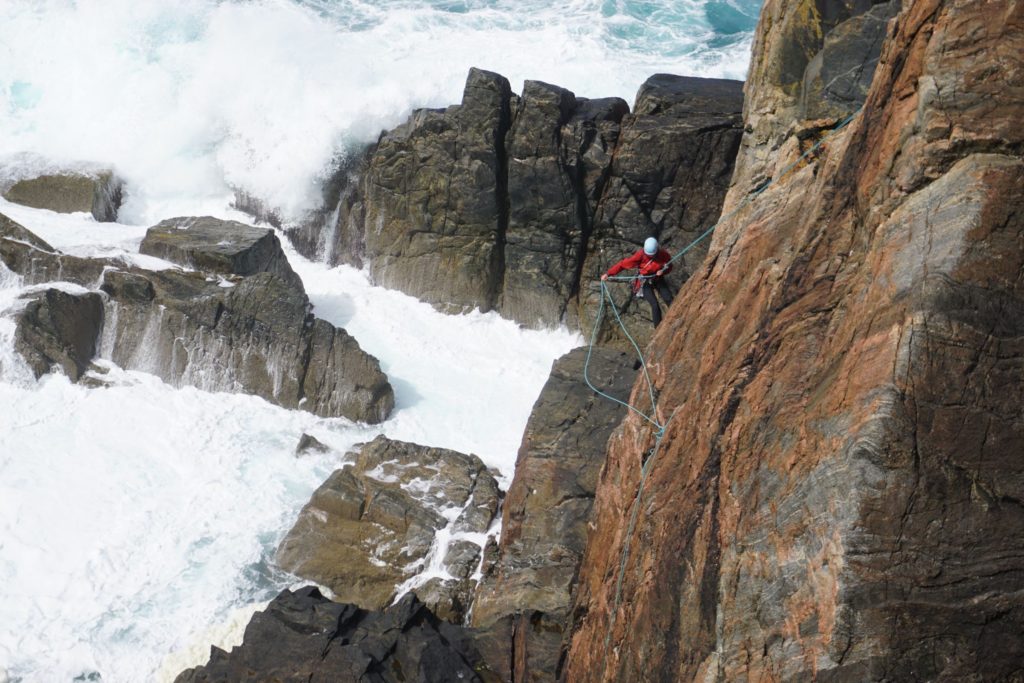Leading its readers from the working heart of the Lake District to the post-industrial landscapes of the Snowdonia slate quarries; the quiet sea-cliffs of Moray to the austere, sparse beauty of the Cairngorm Plateau, Anna Fleming’s ‘Time on Rock’ — our January Book of the Month — sings with a love for the climbing life, writes Heather Dawe.

Anna Fleming on Lewis, photographed by Wil Treasure
This is a joyful book.
In 2021 sport climbing had its Olympic debut. Of the approximately one million people actively climbing in the UK today, around 60% only ever do so indoors. This is where Anna Fleming begins her climbing journey, on the plywood boards and resin holds of climbing walls in the north of England.
But, as the Lake District legend Bill Birkett tells Fleming over a pint in a pub in Grasmere:
‘Climbing is not a sport but a way of life.’
Head instead to the sea-cliffs, quarries, moors and mountains to climb and you will find the hedonistic, piss-taking, living-for-the-moment climbers, and forge lasting friendships with individuals who love the climbing life as much as you. In time you will likely find yourself changed. Those moments of desperately clinging on, moving up the rock in the hope that you will reach safety without falling will strip away the superfluous, leaving behind the things that really matter. Anna’s story is firmly rooted in this part of the climbing life and in what she finds there.
Early in Time on Rock Fleming tells us she does not climb ‘hard’. Those familiar with the mountaineering genre and its traditional focus on those who climb the most arduous and highest will hopefully find this refreshing.
With this loss of ego comes a freeing of the mind. This is something Fleming references frequently during the book, something she recognises she needs to do to truly be at one with the rock. With it comes the ability to explore things other than the difficulty of the climb and how strong she is. Instead of a relentless focus on the challenge and associated adversities, alongside she tells us of the places she climbs in, their stories and their feel. She tells us of her aspirations to climb in higher places and takes us with her on her journeys up into them.
Like many who learn to climb in England, Fleming’s outdoor experiences begin on the gritstone outcrops of the Pennines. She explores the Peak District and the crags of West Yorkshire, along with the landscape and culture around them. Their brooding beauty and industrial heritage, in many ways embodied by the grit, come alive through her telling.
As climbers grow in experience of their pastime, so too does their understanding of its harshness and unforgiving nature. A brush with mortality through the death of a peer, maybe a near-death experience of your own is all too often part of this development. The reality is the mountains don’t reciprocate, they don’t care for us as we do them.
Fleming’s own experience of this happens on the Cuillin Ridge of Skye, when a large block she places her trust in becomes dislodged and falls, threatening to take her down the mountainside with it. Her fall is held by her climbing partner and the rope between them, affirming the importance and value of this connection.
The rock’s sense of deep time is continually explored in Time on Rock, as Fleming describes the geology of the different crags she climbs on — Yorkshire Grit, Skye Gabbro, Cumbrian Rhyolite, Welsh slate, Scottish sandstone sea-cliffs and the granite Cairngorms.
She takes us to these places and through her exploration and experiences we feel the rock and the landscape around it. These chapters show us of the variation in the beauty of the UK’s uplands and the lives of those who live within them. Fleming’s writing takes us to the working heart of the Lake District, the post-industrial landscapes of the Snowdonia slate quarries, the quiet sea-cliffs of Moray and the austere, sparse beauty of the Cairngorm Plateau.
All of these places come wonderfully alive with Anna’s prose but, if I had to choose, I would say ‘Dinorwig’ — in which she describes exploring the slate quarry that runs deeply into the mountain Elidr Fawr — reads the most beautifully. With her we travel into the man-made but dark, wild cavities of the mountain. Alongside her tales of climbing the rock she explores Welsh folklore and culture, wider art and literature, the lives of the quarry-men and deep time, blending all of these subjects superbly.
At one point during the book’s sole excursion outside of the UK, to the Greek island of Kalymnos, I wondered where Anna was taking us. She described climbs where she found herself almost fighting with the rock, frustrated that she struggled to climb the routes her male peers could, that she was not as ‘good’ as they were. As the chapter progresses, she shows us she is discussing these frustrations to expose the differences between men and women when climbing. Not better but different. Down-to-earth discussions follow, of the physical and mental liberations of stopping taking the pill, the way the female body changes through the menstrual cycle and how this impacts on the ability to climb at your limit. What struck me when I read these words was not only how relevant they are, but how they have been missing from the literature.
Time on Rock sings with a love for the climbing life and an appreciation for what it can give to those who become one with the rock and landscape. A breakthrough book in so many ways, from a writer of significant talent.
*
‘Time on Rock’ is out now and available here, published by Canongate. You can read Anna Fleming’s extensive writings for Caught by the River here.
Heather Dawe is a writer, painter and founder of Little Peak Press. Her latest book is ‘Mountain Stories’.